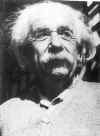
Albert
Einstein, 
Einstein was born in Ulm on March 14, 1879, and spent his youth in Munich, where his family owned a small shop that manufactured electric machinery. When repeated business failure led the family to leave Germany for Milan, Italy, Einstein, who was then 15 years old, withdrew from the schools of Munich. He stayed a year with his parents in Milan, then left to finish secondary school in Arrau, Switzerland, and entered the Swiss National Polytechnic in
Zurich. Again the schools here didn't satisfy Einstein. He often cut classes and used the time to study physics on his own or to play violin. He graduated in 1900 but his professors disliked him and wouldn't recommend him for a position in the University. For two years Einstein was a tutor and substitute teacher but in 1902 he secured a position as an examiner in a Swiss patent office in Bern.
In 1905 Einstein received his doctorate from the University of
Zurich for a theoretical dissertation on the dimensions of molecules, and he also published three
theoretical papers important to the development of 20th-century physics
Published 3 theoretical papers
Einstein believed that a good theory is one in which a minimum number of postulates is required to account for the physical evidence. This sparseness of postulates was what made his work so difficult for colleagues to comprehend, let alone support. However, Einstein did have important supporters. His chief patron was the German physicist Max Planck. After staying at the patent office for four years he moved rapidly upward in the German-speaking academic world. His first academic appointment was in 1909 at the University of Zurich, then in 1911 he moved to the German-speaking University at Prague, and in 1912 he returned to the Swiss National Polytechnic in
Zurich. Finally, he was appointed director of the Kaiser Wilhelm Institute for Physics in Berlin in 1913.
After 1919, Einstein became internationally renowned. He accrued honors and awards, including the Nobel Prize in physics in 1922, from various world scientific societies. The two social movements that received his full support were pacifism and Zionism. During World War I he was one of a handful of German academics willing to publicly decry Germany's involvement in the war. After the war his continued public support of pacifist and Zionist goals made him the target of vicious attacks. Even his scientific theories were publicly ridiculed, especially the theory of relativity. When Hitler came to power, Einstein immediately decided to leave Germany and move to the United States. He took a position at the Institute for Advanced Study at Princeton, New Jersey. While continuing his efforts on behalf of world Zionism, Einstein renounced his former pacifist stand in the face of the huge threat to humankind posed by the Nazis in Germany. In 1939 Einstein collaborated with several other physicists in writing a letter to President Franklin D. Roosevelt, pointing out the possibility of making an atomic bomb and the likelihood that the German government was embarking on such a course. The letter, which bore only Einstein's signature, helped lend urgency to efforts in the U.S. to build the atomic bomb, even though Einstein himself played no role in the work and knew nothing about it.
After the war, Einstein was active in the cause of international disarmament and world government. He continued his active support of Zionism but declined the offer made by leaders of the state of Israel to become president of that country. In the U.S. he spoke out on the need for the nation's leaders to make any sacrifice necessary to preserve political freedom. Einstein died in Princeton on April 18, 1955.
Einstein's efforts in behalf of social causes have sometimes been viewed as unrealistic. In fact, his proposals were always carefully thought out. Like his scientific theories, they were motivated by sound intuition based on a careful assessment of evidence and observation.